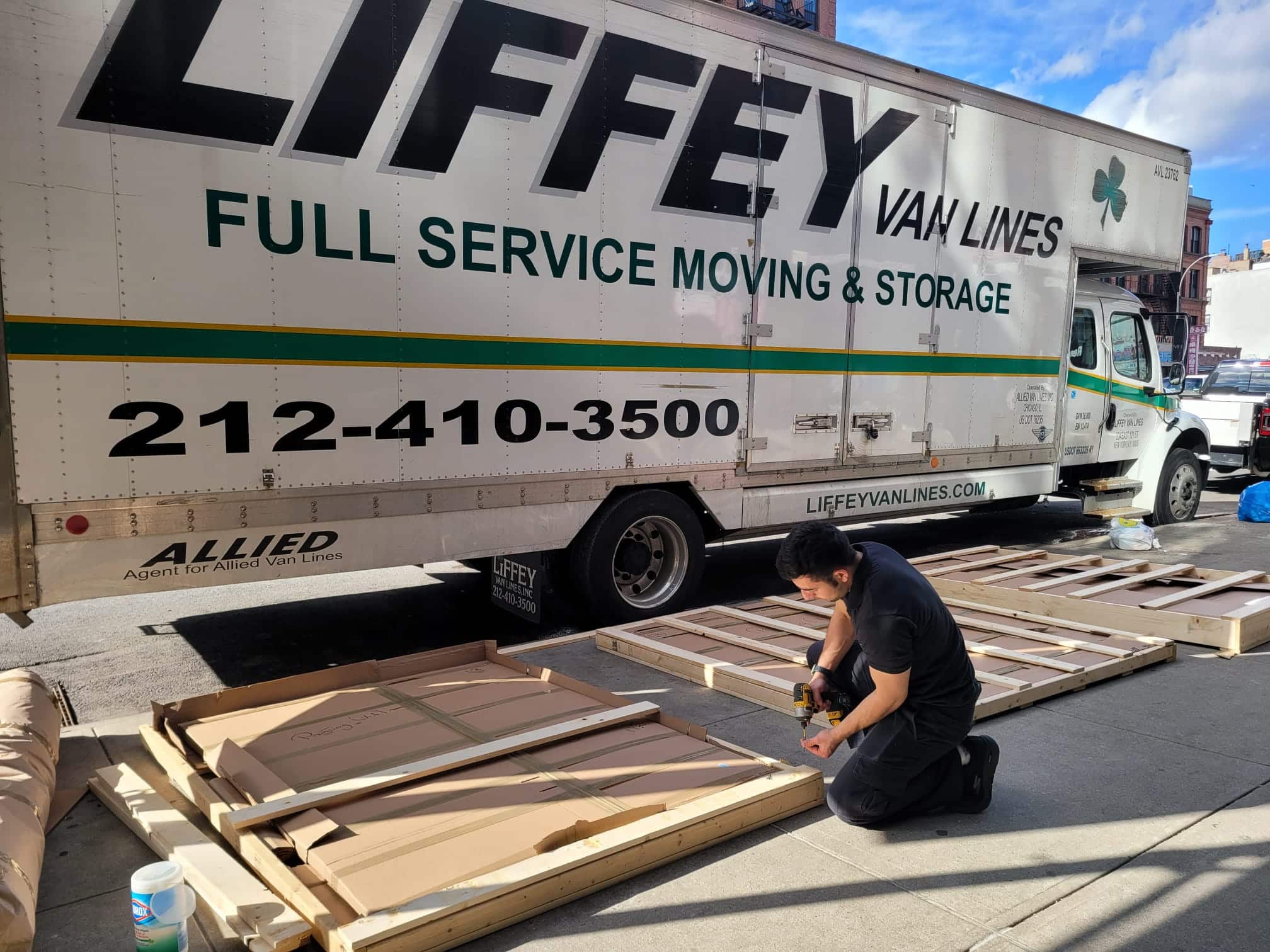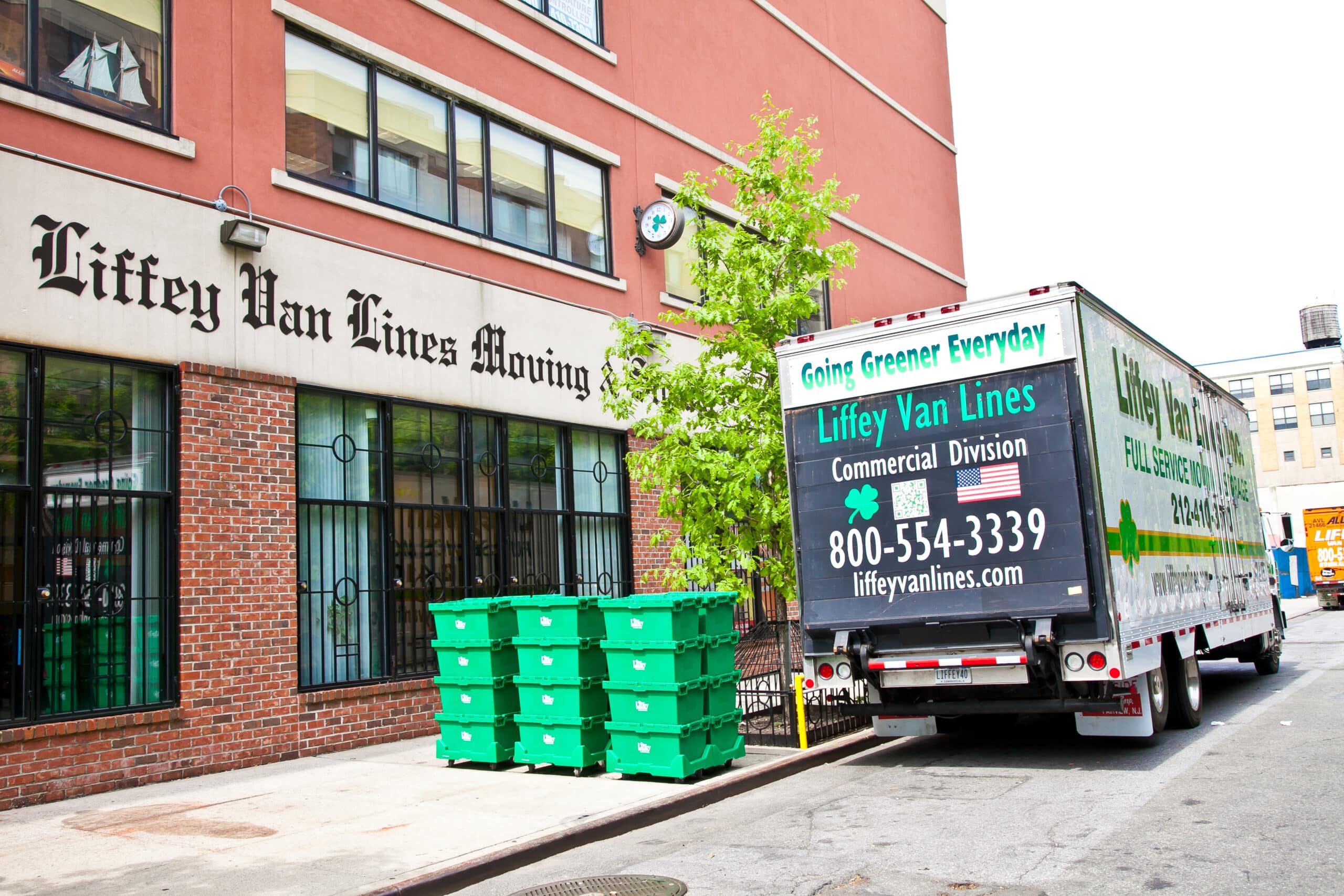Table of Contents
It’s moving day in Manhattan. Your movers have arrived, but your building’s superintendent tells you that the service elevator is booked until 3 PM. What now? NYC elevator reservations are one of the most underestimated logistics when planning an apartment move. Failing to schedule properly can delay your move, cost extra money, and frustrate both tenants and movers.
Quick Answer: To secure a smooth NYC move, schedule your building’s elevator reservation at least 2 weeks in advance. Many co-op and condo boards in Manhattan, Brooklyn, and Queens require formal elevator booking and a Certificate of Insurance (COI) from your moving company before work can begin.
According to the NYC Department of Buildings, property managers set their own elevator access policies and may require reservations for moves to avoid service disruptions. At Liffey Moving, we simplify this process by contacting building management directly to confirm access windows in advance.
Learn about our professional moving services to discover how we handle city-specific challenges like these every day.
When planning a move in NYC, coordinating your elevator reservation with your building’s management office is crucial. Most city high-rises and co-ops have strict moving schedules and require liability coverage.
Typical requirements include:
Pro Tip: Liffey Moving provides all required COI documentation and elevator protection materials automatically. We coordinate directly with your super or building manager so you don’t have to.

For moves in neighborhoods like the Upper West Side or Downtown Brooklyn, some buildings require 10–14 days’ notice to reserve the elevator. Check your building’s handbook or ask the management company for written moving procedures.
The best way to avoid moving chaos is to align your mover’s schedule with your building’s elevator reservation window. NYC elevator reservations should always be your first step after confirming your moving date.
1. Book your mover early: Aim for at least 3–4 weeks’ lead time during peak season (May–September).
2. Contact building management immediately: They’ll confirm your available elevator slots.
3. Coordinate move duration with movers: Ensure your moving company knows your time window to prevent last-minute rushes.
4. Allow buffer time: Traffic, parking, or elevator delays can quickly add 30–60 minutes.
Pro Tip: Use Liffey’s hourly rate movers for flexible scheduling—ideal when your elevator access isn’t perfectly timed.
Brooklyn brownstones and pre-war buildings often lack elevators altogether. In those cases, our crews are trained to handle multi-story walk-ups efficiently using specialized lifting straps and stair protection pads.

Reserving an elevator is only part of the NYC move equation—street access is another hurdle. Trucks parked improperly can result in fines or towing, especially in Midtown and SoHo.
According to the NYC Department of Transportation, moving trucks must follow posted signage, and temporary DOT parking permits can be obtained for legal loading zones.
Key steps:
Pro Tip: Liffey handles DOT permit applications for local moves under our local New York moving services, ensuring no last-minute surprises.
Every professional NYC moving company should provide a COI—proof of liability coverage for potential property damage. Most co-op and condo buildings require COIs before allowing any moving activity in freight areas.
Typical COI coverages include:
Liffey Moving sends your COI directly to building management and ensures elevator protection—padding, blankets, and floor guards are installed before loading.
Pro Tip: Our specialty moving services include customized COIs for luxury properties and high-risk environments like Park Avenue high-rises.

During NYC’s peak moving season (May through September), elevator reservations become competitive. In luxury condos across Tribeca and Midtown East, elevator slots can fully book out 3–4 weeks ahead.
Strategies to secure your spot:
Pro Tip: Liffey’s long-distance moving clients often schedule weekday pickups to maximize building access and reduce wait times.
Elevator reservation fees aren’t common, but some luxury buildings charge for after-hours staffing or extra protection materials. Typical fees range from $100–$400 depending on building policy.
Example cost breakdown for coordination-heavy moves:
| Move Type | Average Cost | Elevator Type | Notes |
|---|---|---|---|
| Manhattan High-Rise | $2,000–$3,000 | Freight Elevator | Requires weekday booking |
| Brooklyn Brownstone | $1,500–$2,000 | Stair Climb | No elevator, manual carry |
| Queens Mid-Rise | $1,200–$1,800 | Shared Service | Residential buildings often flexible |
For most buildings, elevator reservations are free but mandatory. Not booking early can lead to delay penalties or rebooking fees from your mover.
Pro Tip: Liffey’s guaranteed flat-rate quotes include waiting time and COI coordination—no surprise charges if your elevator slot moves slightly.
Even seasoned New Yorkers can overlook details that cause delays. Avoid these typical errors:
Stay proactive by confirming your COI, reservation times, and vendor approval list 1–2 weeks ahead.
Pro Tip: Our experience with hundreds of NYC buildings—from The Dakota to newer towers like One Manhattan Square—means we can handle these forms faster than most moving teams.
Most NYC buildings require at least 1–2 weeks’ notice for elevator reservations. Luxury co-ops may ask for 3–4 weeks during high season. Book early to guarantee availability.
Yes, almost every NYC co-op or condo requires a Certificate of Insurance from your mover. Liffey Moving manages this paperwork and sends it directly to building management.
Your best option is to adjust your moving date or see if your building offers evening access. Liffey can accommodate schedule shifts with proper notice.
Trucks must comply with DOT regulations and posted signs. Without a valid permit, your movers can’t legally park close to the building, causing delays.
Many buildings restrict weekend moves to avoid disturbing residents. Always confirm your building’s rules before booking movers.
We contact building managers directly, secure time slots, and coordinate COIs. Our 45+ years of experience ensure each move aligns with building access policies across NYC.
They can be slightly higher due to coordination and waiting times. However, Liffey Moving’s guaranteed pricing model ensures you’ll never pay unexpected hourly surcharges.
For a successful NYC move with elevator access, preparation is everything. Before your move day:
With 45+ years of expertise and an Allied Van Lines partnership, Liffey Moving ensures every NYC elevator reservation goes smoothly, from Midtown condo high-rises to Brooklyn brownstones.
Ready to book a stress-free move? Call (212) 410-3500 or get a free quote today.
Your move deserves the expertise of professionals who know NYC elevator reservations inside and out—and that’s exactly what you’ll find with Liffey Moving.


